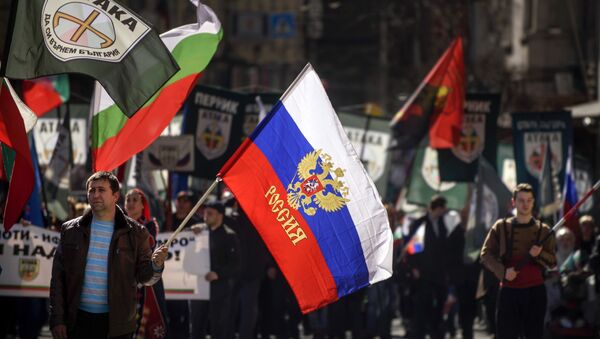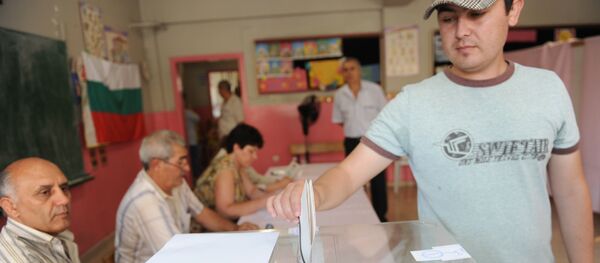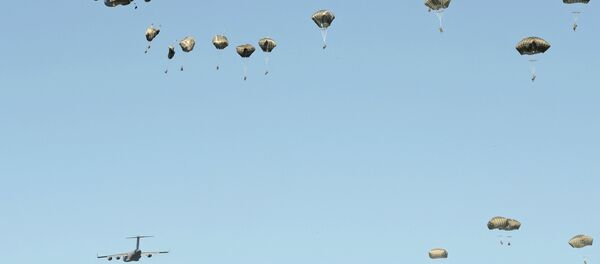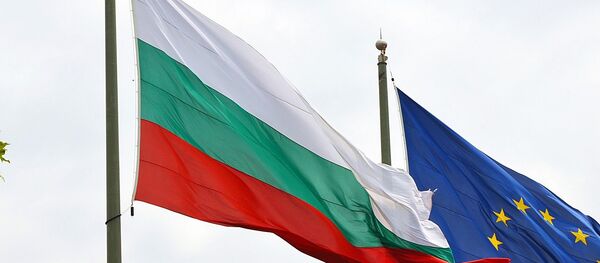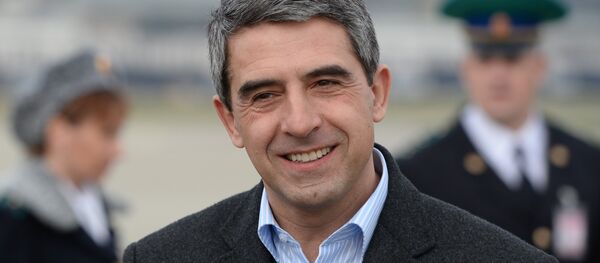Ahead of Sunday's vote, both leading parties, the Bulgarian Socialist Party (BSP), which won last year's presidential elections, and the Citizens for European Development of Bulgaria (GERB), a center-right pro-EU party, have promised to improve economic and political ties with Russia. According to polling by Bulgarian pollster Alpha Research, the parties are neck and neck, polling at 31.7% and 29.1% among prospective voters, respectively. The Movement for Rights and Freedoms, a liberal party promoting Turkish minority interests, is polling third, and expected to receive between 9-10% of the vote.
These projects, according to both parties, would provide the Bulgarian economy with a much needed boost. Furthermore, the Socialists have repeatedly emphasized that sanctions and countersanctions have significantly impacted a number of local industries, including construction.

According to Manukov, Moscow benefits from prevailing attitudes among many Bulgarians that their country's decade in the EU has done little to help the economy. Bulgaria has an average monthly salary of 500 euros a month, one of the lowest in Europe. And while the Balkan nation is a member of both the EU and NATO, it continues to have significant ties with Russia, based on a long, common history.
Unfortunately, some Bulgarian observers have indicated that the pro-Russian campaign rhetoric of Bulgaria's top two parties is a PR moved aimed at attracting voters. After the elections, the party that wins will again explain to their countrymen that Bulgaria is a member of Western institutions. They will remind voters that the European Commission has given Bulgaria 11 billion euros in infrastructure grants. Furthermore, they can point to the fact that EU countries account for over 60% of Bulgarian exports, while Russia accounts for just 1.5%.

Analysts predict a low turnout for Sunday's vote. Up to one fifth of Bulgarians say that they are tired of elections, with Sunday's vote being the third in four years, and that they will stay home. Those that do vote will have to look closely to find differences in the parties' programs.
However, according to Manukov, there is a clear favorite as far as Russian-Bulgarian ties are concerned.
"If the Socialists win, and party leader Korneliya Ninova becomes prime minister, Bulgaria, which has long maneuvered between East and West, may turn toward Moscow. The Socialist leader has spoken critically of Brussels, and is unsatisfied, for example, with the fact that the European Commission considers Bulgaria a 'second class' member of the EU. The Socialists also promise to veto the extension of sanctions against Russia. However, all this of course does not mean that the Socialists want to actually leave the EU or NATO."
Foreign Meddling
Perhaps more interesting to international observers is the flood of rumors and reports about external meddling in the Bulgarian elections, particularly by Turkey (which has interfered openly) and Russia (which has been accused of meddling, but without any evidence to substantiate the claim).
President Rumen Radev called the meddling "absolutely unacceptable." Sofia has also expelled one Turkish citizen and banned the entry of two others following reports that a serving Turkish minister and even the ambassador had campaigned for DOST.
Turkish President Recep Tayyip Erdogan blasted Sofia for the supposed "pressure" it put on Bulgarian Turks, saying such pressure was "unacceptable," and incompatible with democracy. President Radev responded that "Bulgaria neither gives nor accepts lessons in democracy, especially from countries that do not respect the rule of law."
Earlier this week, protesters blocked several border crossings between the two countries, ostensibly to prevent Turks with Bulgarian passports from being bussed into the country to vote on Sunday. The protesters at one checkpoint carried slogans reading "No to Electoral Tourism" and "Hands Off Bulgaria."

Amid reports of a Turkish trace, some Bulgarian politicians and media have also accused Russia of interference. Last week, former President Rosen Plevniliev made the claim that Russia was actively meddling in Bulgaria's elections. Foreign Minister Radi Naidenov responded, saying that he saw no evidence of any Russian interference.
Western media soon joined in spreading the rumors, but taking a different approach. On Thursday, the Wall Street Journal reported on a mysterious 30-page document supposedly created in Moscow and intercepted by the Bulgarian security services. The document, the paper said, outlined a strategy for the Socialists to ensure victory in last November's presidential election. The strategy supposedly included the dissemination of fake news, polling showing trumped up support for Radev, and the dissemination of positive materials about the Socialist candidate in the media.
Commenting on the WSJ story, RIA Novosti contributor Vladimir Ardayev suggested that it effectively served to kill two birds with one stone –demonstrating the Kremlin's devious operations in Bulgaria, but also reminding readers of this same 'Russian meddling' in elections in the US and Western Europe. The only problem, Ardayev suggested, was that "not a single fact about attempts to exert such influence have actually been proven."
Finally, Dmitri Abzalov, president of the Center for Strategic Communications, suggested that Western paranoia about the mystical 'hand of Moscow' behind all events actually serves to benefit Moscow.
After all, Abzalov noted, it perfectly demonstrates the recognition of Moscow's growing role in global geopolitics, and its amplified weight in world affairs. Russia's leaders, he suggested, would do well to try to extract some benefits from this state of affairs.

